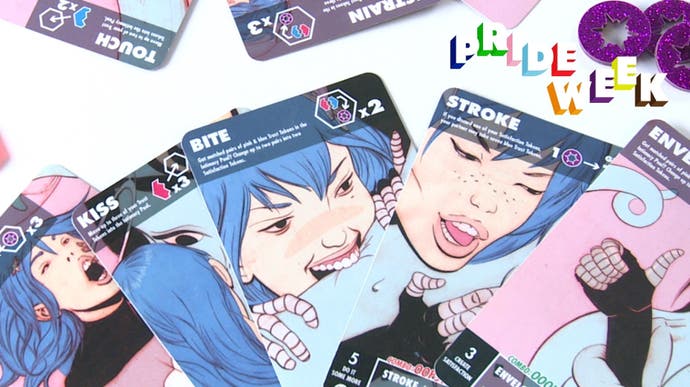Towards more speculative sex
Or "why sci-fi fucking needs to get weirder and how games are paving the way".
Hello! All this week we'll be celebrating Pride and the power of positive representations in games. Every day we'll be bringing you stories and insights from different parts of the LGBT+ community. You can also help support Pride with Eurogamer's newly redesigned t-shirt - all profits from which will be going to charity.
In 2015, the Wachowski sisters asked a very important question via their sci-fi TV show Sense8: If eight people were psychically connected to share each other's senses, how would they have sex?
The answer - enthusiastically and at a distance - notwithstanding, the question itself proves important. By asking it, the Wachowskis applied a fundamental lens of speculative fiction - a view towards questioning what is, can be, or will be possible - to sex.
"Resistance and change often begin in art," said speculative-fiction giant Ursula Le Guin in her 2014 National Book Award speech, with a pointed nod towards science fiction and fantasy. Especially now, with the rise of "geekdom" as a mainstream, socially acceptable hobby, at least in the west, the idea that speculative fiction helps reimagine and perhaps pave the way for new socio-technological realities is neither contentious nor particularly novel. Since people began telling stories, we've been imagining the impossible and subsequently using these stories to expand the boundaries of the possible. After all, long before Soviet cosmonaut Alexei Leonov's 1965 spacewalk in a nylon and metal spacesuit, Icarus soared to the sun on wax wings.
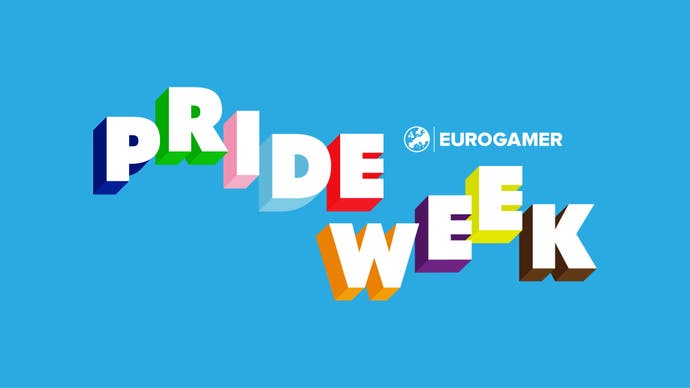
Which brings us back to sex. While sci-fi/fantasy authors spend a great deal of time conceptualizing various aspects of our humanity, reimagining how we have sex is often passed up for more "socially acceptable" topics. For queer folks, this is significant: who we have sex with, how often we have sex, and how frequently we choose to have sex is often the basis for discrimination against queer people around the world. There absolutely exists in culture an idealized, normative sexual praxis. And to seek out representation of anything else is to delve into the world of independent artists, of queer subcultures, and niche hobbies.
Consider, for instance, representations of the bodies we have sex with, especially the sentient but non-human kind. If we can conceive of intelligent aliens with whom we form emotional attachments, we can conceive of the desire to have sex with them. And while we can dream up scores of weird, unusual or monstrous bodies against which to wage war, our depictions of aliens to have sex with is sadly lacking in diversity. Mainstream film and television, at least, are mired in the heteromasculine gaze, where fuckable aliens tend to be lithe human women with brightly coloured skin. Hell, even Jabba the Hutt, a giant desert-slug, favours oddly Western-human ideals of beauty.

In fact, we'd rather show no body than one that deviates from our beauty standards. While 2013's Her is a deep, fascinating look at how humans might bond with and come to love artificial intelligences, that love is a rather chaste one. Joaquin Phoenix's Theodore is utterly content with the occasional bout of late-night dirty talk (with a hint of fade-to-black masturbation) with his disembodied, AI-girlfriend, the same activity he used to engage in with human sex-chatroom lurkers. He clearly has never heard of sex toys, nor the (rather ridiculously named, true) field of teledildonics. The movie does enter interesting territory when he tries to sleep with a human mimicking the AI-girlfriends moves according to instructions whispered into her earpiece, but this look into the sexual politics of human-OS threesomes fizzles out quickly and never resurfaces.
Contrast this with Naomi Clark's Consentacle, a 2-player card game that embraces a monstrous, speculative beauty. You play a human astronaut and an alien attempting to maximize each other's pleasure while in joyous flagrante delicto. The alien, Dup, is basically an enormous blue-purple head with extra eyes and multiple tentacles, complete with octopus-like suckers. The astronaut Kit is a human woman. And yet, despite the anatomical gulf, the game models their sex acts (represented via cards), as joyful an uninhibited. The two characters tease each other, bite, kiss, and caress each other, exchange soulful gazes, and insert arms into each other's "hungry orifices". There's even a comic.
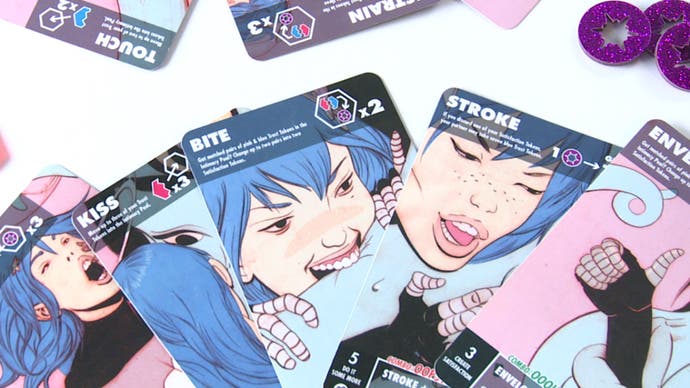
And why not? When we conceive of queer sex and queer bodies, we reject what is considered "normal" and embrace the unusual, the taboo, and yes, the inconceivable. Consentacle, for the most part, is a game about how partners can communicate healthily, but it's also a game that encourages you to think about who your sex partner is and what their body could be. As a piece of speculative art, it emphasizes possibility; as a game, it invites players to make decisions and choices within these possibilities, picturing themselves, perhaps in a wholly new sexual light.
Consentacle is probably a more extreme depiction, but even when media try to depict "unusual" sexual proclivities here on earth, we're served the same old 50 Shades of Grey: bland, sanitized representations of sexual practices that were once fiercely queer. Small wonder that "kink" has become synonymous with BDSM for many (straight cis) folks.
Games are not so shy. Alex Robert's game POP!, which I had the pleasure of editing for an anthology of erotic games, focusses on the lives and loves of balloon fetishists. Far from mocking the practice, the game portrays its subject matter in a sensitive light. As a larp, where players create much of the story, it encourages players to be just as attentive: "keep love in your heart. Looners, as they often identify, are real people." It tasks the players with sensitively exploring the community and society of those who have sex with balloons.
These social impacts of a more speculative sexual practice are often simplified by mainstream media. HBO's Westworld might be attempting to question the nature of consciousness and intelligence, but when it comes to sex, the show's message never really advances beyond, "have robot, will fuck." Similarly, if we examine depictions of VR sex (I'm recalling Arnold Schwarzenegger's little romp in Total Recall) the social consequence of being able to have constant idealized sex aren't really discussed.
By contrast, Troels Ken Pederson's larp My Girl's Sparrow zooms in on the physical aspects of sex in a futuristic world where VR is the only (acceptable) mode of sex. In Pederson's game, the near-future world considers meatspace sex to be gauche and gross. The freeform game's main focus is on a group of friends who rent a cabin for the sole purpose of taboo physical intimacy, and much of play consists of describing, in minute detail, the blow-by-blow of your sex acts. The game never feels pornographic, however. Rather, the detailed erotic descriptions serve to highlight the fact that these characters never get to do this in real life. "Sex isn't an indeterminate mass - its details matter," Pederson writes. "What we do together and how we react to each other says a lot about who we are." How does it feel?, the game asks of you, and then constrains you further by forbidding you to ever discuss your feelings. How does sex feel when the norm is taken away from you? Or under another interpretive light, how does it feel to have queer sex?

The concept of feeling and sensation is studied through a different lens by Kat Jones and Will Morningstar in You Inside Us - another title in the Honey & Hot Wax anthology of erotic art games I mentioned earlier. In this two-player larp, one player takes on the role of a human colonist of a distant planet, while the other plays an alien symbiont that comes to live inside the body of the former. The game asks us to examine the physical sensations we might often take for granted, and ask ourselves what physical pleasure and eroticism really mean. The two players, who maintain some form of physical contact throughout the game, describe mundane actions the human performs with their body in their day to day, and explore how it feels now that an alien is in residence. Has the nose become an erogenous zone? Does the act of eating soup now trigger tingles down one's spine? "Be indulgent, intense, and weird," the designers urge you, because the game is about, "making familiar sensations alien, [and] making alien sensations real and intimate."
Jones and Morningstar position sex as something present within the banal, quotidian world. In the tiny, indie video game Stick Shift, Robert Yang does the same - only he focusses on the hyper specific act of, well, masturbating a car. Or perhaps you're masturbating yourself via the car? Or is the car just your kink? Either way, Yang asks:
"What if sex in games was something we did, instead of something we obtained? One way to do sex is to see sex everywhere. Sex here, sex there, sex behind yonder tree!... and sex through the tender caresses that seduce gay cars everywhere."
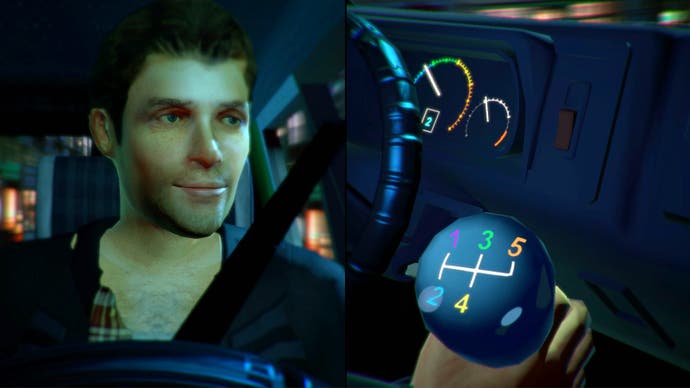
Yang, Jones, and Morningstar want us to normalize sexuality, want us to explore erotic possibility where society says there is none, want us to break out of the confines of "here and a this time are when you receive sex, as a result of this action." By replacing "ordinary" with "sexual", these games allow us to reject heteronormative dicta of what constitutes sex, give us permission to question what we ourselves desire, what we lust for, and what, for each of us, makes sex sex.
Finally, on the topic of queerness and sex, gender must inevitably come into play. Gender and the possible deviations from our binary norm are still relatively taboo topics in mainstream media. More than fifty years after Le Guin's The Left Hand of Darkness, where the inhabitants of the planet Gethen have no gender as a default and shift gender once a month, most science fiction does little to speculate on our notions of gender. Now consider Avery Alder's indie tabletop roleplaying game Dream Askew. You play members of an enclave of queers, attempting to "live, sleep, and hopefully heal" and maybe carve out a utopia in a post-apocalyptic world. At character creation you choose a gender. The game, however, eschews, "male" or "female", and instead presents a variety of new options: "gargoyle", "dagger daddy", "ice femme", "raven". Alder writes:
"Creating a character in Dream Askew involves contending with gender, but it's a gender exploded, extracted from the society intact and made mutant. What do some of these words even mean? [...] When you encounter a gender word, imagine. Ask your fellow players. Flirt with a search engine. If nothing comes up, invent. No matter how you come to your initial understanding, it's yours to continue to define through play."
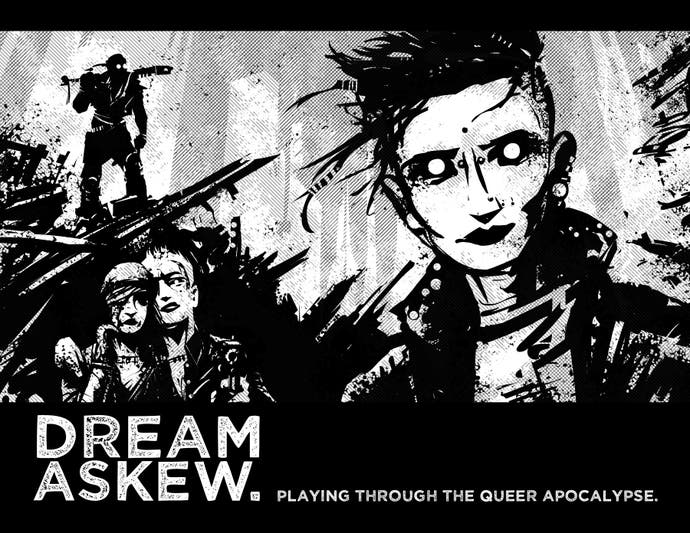
Not content with simply offering new ideas about gender, Alder encourages players to come up with their own, and in an unusually intersectional move, links these gendered markers to other dimensions of identity like ethnicity or social class.
If speculative fiction is to offer us a vision of a better, queerer future, we need to stop ignoring a facet of the human experience as significant as sex. Like Sense8 with its multi-gender psychic orgy, Black Mirror and its virtual-crossplay-coitus, or the legion of indie, underground games that explore the hornier side of life, sci-fi and fantasy media should strive to explore the future of fucking. We should be unafraid to poke at our conceptions of gender, prod our communities and reactions to intimacy, and probe at our kinks and desires. We need to play more with sex.
The Effing Foundation for Sex-Positivity's mission is to reduce sexual shame and normalise conversations around human sexuality by fostering sex-positive art and education. Two generous grants from them was what made "Honey & Hot Wax" possible. You can donate to The Effing Foundation here.
